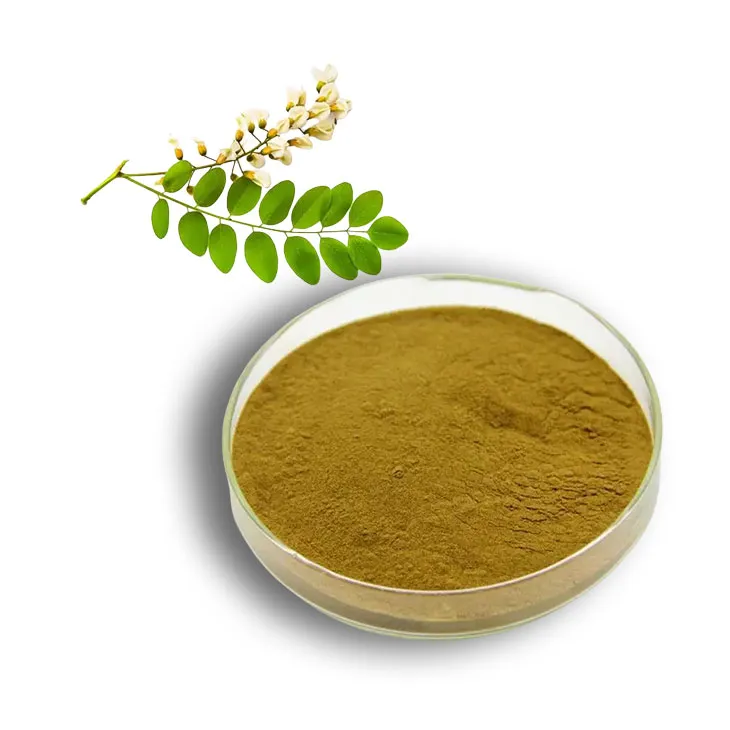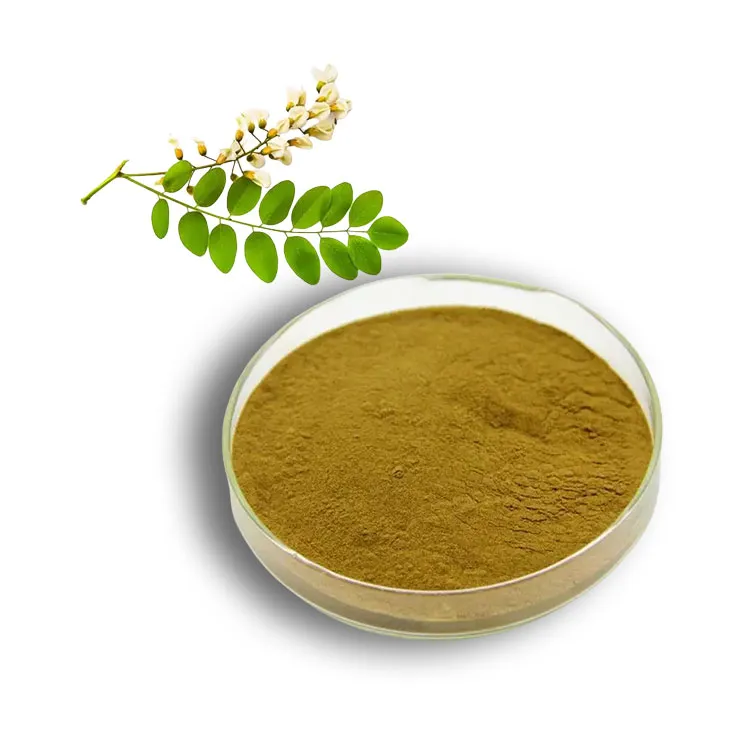- 0086-571-85302990
- sales@greenskybio.com
Sophora Japonica Flower Extract: A Journey Through Botany, Tradition, and Modern Science
2024-07-04

1. Introduction to Sophora japonica
The Sophora japonica, also known as the Japanese pagoda tree, is a remarkable tree species in the botanical world. It is native to East Asia, including China, Japan, and Korea. This deciduous tree can reach significant heights, often growing up to 20 meters or more. Its bark is typically gray - brown and has a rough texture. The leaves are pinnately compound, with small, oval - shaped leaflets that give the tree a lush and elegant appearance.
The tree is well - adapted to various environmental conditions. It can tolerate a certain degree of drought and is relatively resistant to pests and diseases. In urban environments, it is sometimes planted as a shade tree due to its large canopy. Its flowers are one of its most distinctive features, which play a crucial role in the context of the Sophora Japonica Flower Extract.

2. Traditional Uses of Sophora Japonica Flower in Herbal Remedies
For centuries, the Sophora japonica flower has been an integral part of traditional herbal medicine in Asian cultures.
2.1. In Chinese Traditional Medicine
In Chinese traditional medicine, the flower has been used for various purposes. It was believed to have properties that could cool the blood and stop bleeding. For example, it was used in the treatment of certain types of hemorrhages, such as nosebleeds or excessive menstrual bleeding. The flower was often prepared as a decoction, where it was boiled in water to extract its medicinal properties. Physicians in ancient China also thought that it could help in relieving heat - related symptoms, such as fever and restlessness.
2.2. In Japanese and Korean Traditional Medicine
In Japanese and Korean traditional medicine, similar uses were found. The Sophora japonica flower was used in remedies for internal heat disorders. It was also sometimes used topically in the form of poultices to treat skin inflammations. These traditional uses were passed down through generations, relying on the empirical knowledge of herbalists and traditional healers.

3. The Chemical Composition of Sophora Japonica Flower Extract
Modern scientific analysis has revealed the complex chemical composition of the Sophora Japonica Flower Extract.
3.1. Flavonoids
One of the major groups of compounds found in the extract is flavonoids. These are natural plant pigments with antioxidant properties. Examples include rutin and Quercetin. Rutin has been shown to strengthen blood vessels, which may be related to the traditional use of the flower in treating bleeding disorders. Quercetin is known for its anti - inflammatory and antioxidant effects, which could potentially contribute to the overall medicinal properties of the extract.
3.2. Alkaloids
Alkaloids are also present in the extract. These are nitrogen - containing organic compounds. Some alkaloids in the Sophora japonica flower extract may have pharmacological activities. However, further research is needed to fully understand their functions and potential toxicity, as alkaloids can sometimes have complex effects on the body.
3.3. Other Components
In addition to flavonoids and alkaloids, the extract contains other components such as phenolic acids, sterols, and polysaccharides. Phenolic acids contribute to the antioxidant capacity of the extract. Sterols may play a role in cell membrane structure and function, while polysaccharides could potentially have immunomodulatory effects.

4. Modern Scientific Research on Sophora Japonica Flower Extract
The potential of the Sophora Japonica Flower Extract has attracted significant scientific attention in modern times.
4.1. Antioxidant Activity
As mentioned earlier, the presence of flavonoids and phenolic acids endows the extract with antioxidant activity. Antioxidants are crucial for the body as they can neutralize free radicals. Free radicals are unstable molecules that can cause damage to cells, leading to various diseases such as cancer, heart disease, and neurodegenerative disorders. In vitro studies have demonstrated that the extract can effectively scavenge free radicals, suggesting its potential as a natural antioxidant source.
4.2. Anti - Inflammatory Effects
The anti - inflammatory effects of the extract have also been investigated. Inflammation is a complex biological process that is involved in many diseases. The flavonoids, particularly Quercetin, in the Sophora Japonica Flower Extract have been shown to inhibit the production of inflammatory mediators such as cytokines. In animal models, the extract has been observed to reduce inflammation in various tissues, indicating its potential for treating inflammatory diseases such as arthritis.
4.3. Cardiovascular Health
The presence of rutin in the extract may have implications for cardiovascular health. Rutin can help to improve the elasticity of blood vessels, reducing the risk of blood vessel rupture. It may also have a role in reducing blood lipid levels, which is beneficial for preventing atherosclerosis. Some studies have suggested that the Sophora Japonica Flower Extract could be a potential natural supplement for maintaining cardiovascular health.
4.4. Anti - Cancer Potential
Initial research has also explored the anti - cancer potential of the extract. Some in vitro studies have shown that certain components of the extract can inhibit the growth of cancer cells. However, it is important to note that these are early findings, and much more research is needed to determine whether the extract can be used as an effective anti - cancer agent in vivo and to understand the underlying mechanisms.
5. Applications in Medicine
Based on the traditional uses and modern scientific research, the Sophora Japonica Flower Extract holds promise for various medical applications.
5.1. Dietary Supplements
Given its antioxidant and potential health - promoting properties, the extract could be developed into dietary supplements. These supplements could be used to support overall health, especially in individuals at risk of oxidative stress - related diseases. However, strict quality control and safety assessment would be required to ensure their efficacy and safety.
5.2. Herbal Medicines
There is potential for the extract to be incorporated into herbal medicines. Traditional medicine systems could be further explored and integrated with modern medicine to develop new herbal formulations for treating specific diseases. For example, in the treatment of inflammatory bowel diseases, the anti - inflammatory properties of the extract could be harnessed.
5.3. Pharmaceutical Research
The chemical components of the extract could serve as a starting point for pharmaceutical research. Scientists could study these components to develop new drugs. For instance, if the anti - cancer potential of certain compounds is further validated, they could be chemically modified or used as lead compounds to develop more effective anti - cancer drugs.
6. Applications in Cosmetics
The Sophora Japonica Flower Extract also has applications in the cosmetics industry.
6.1. Skin Health
Due to its antioxidant and anti - inflammatory properties, the extract can be used in skin care products. It can help to protect the skin from environmental damage, such as UV radiation and pollution. In addition, it may be beneficial for treating skin inflammations, such as acne and eczema. Cosmetic products containing the extract could promote healthier - looking skin.
6.2. Hair Care
The extract may also have applications in hair care. It could potentially strengthen hair follicles, reduce hair loss, and improve the overall quality of the hair. For example, it might be used in shampoos or hair conditioners to nourish the hair and scalp.
7. Challenges and Future Directions
Despite the potential of the Sophora Japonica Flower Extract, there are several challenges and areas for future research.
7.1. Standardization of Extract
One of the main challenges is the standardization of the extract. Since the chemical composition of the Sophora japonica flower can vary depending on factors such as the plant's origin, growth conditions, and extraction methods, it is difficult to ensure a consistent product. Standardization is crucial for both medical and cosmetic applications to ensure reliable efficacy and safety.
7.2. Toxicity and Safety Studies
Although the traditional use of the flower in herbal remedies suggests a certain level of safety, more comprehensive toxicity and safety studies are needed. This is especially important when considering its use in new medical and cosmetic products. The potential toxicity of alkaloids in the extract, for example, needs to be further investigated.
7.3. Clinical Trials
Most of the current research on the Sophora Japonica Flower Extract is based on in vitro and animal studies. To truly validate its potential for medical applications, well - designed clinical trials are required. These trials should focus on specific diseases and evaluate the efficacy and safety of the extract in humans.
7.4. Unlocking New Potentials
Future research could also focus on unlocking new potentials of the extract. For example, exploring its effects on the gut microbiota or its potential in regenerative medicine. There may be many untapped areas where the Sophora Japonica Flower Extract could have significant applications.
8. Conclusion
The Sophora Japonica Flower Extract is a fascinating subject that bridges the gap between botany, tradition, and modern science. Its traditional uses in herbal remedies have provided a foundation for modern scientific research. The complex chemical composition of the extract, with components such as flavonoids, alkaloids, and phenolic acids, offers a wide range of potential health benefits. From antioxidant and anti - inflammatory effects to potential applications in medicine and cosmetics, the extract shows great promise. However, challenges such as standardization, toxicity studies, and clinical trials need to be addressed to fully realize its potential. With continued research, the Sophora Japonica Flower Extract may play an increasingly important role in improving human health and well - being in the future.
FAQ:
What is Sophora Japonica?
Sophora japonica is a well - known tree species in botany.
How long has Sophora Japonica Flower Extract been used in traditional herbal remedies?
It has been an integral part of traditional herbal remedies for centuries.
What are the potential areas that modern scientific research has explored regarding Sophora Japonica Flower Extract?
Modern scientific research has been exploring its potential in areas like antioxidant, anti - inflammatory, and more.
Why is Sophora Japonica Flower Extract considered a bridge between the past and present?
Because it represents a connection between the wisdom of traditional herbal use in the past and the technological advancements in modern science today, with great potential for future applications in various industries.
What industries may Sophora Japonica Flower Extract have future applications in?
It may have future applications in medicine, cosmetics, and other industries.
Related literature
- Botanical Studies on Sophora japonica"
- "Traditional Uses and Modern Research of Sophora japonica Flower Extract"
- "The Antioxidant and Anti - inflammatory Properties of Sophora japonica Flower Extract: A Review"
- ▶ Hesperidin
- ▶ Citrus Bioflavonoids
- ▶ Plant Extract
- ▶ lycopene
- ▶ Diosmin
- ▶ Grape seed extract
- ▶ Sea buckthorn Juice Powder
- ▶ Fruit Juice Powder
- ▶ Hops Extract
- ▶ Artichoke Extract
- ▶ Mushroom extract
- ▶ Astaxanthin
- ▶ Green Tea Extract
- ▶ Curcumin
- ▶ Horse Chestnut Extract
- ▶ Other Product
- ▶ Boswellia Serrata Extract
- ▶ Resveratrol
- ▶ Marigold Extract
- ▶ Grape Leaf Extract
- ▶ New Product
- ▶ Aminolevulinic acid
- ▶ Cranberry Extract
- ▶ Red Yeast Rice
- ▶ Red Wine Extract
-
Panax Ginseng Leaf Extract
2024-07-04
-
Acai Berry Extract
2024-07-04
-
Curcuma Longa Extract/Turmeric extract
2024-07-04
-
Grape Seed Extract
2024-07-04
-
Propolis Extract Powder
2024-07-04
-
Sophora Japonica Flower Extract
2024-07-04
-
Soy Extract
2024-07-04
-
Dandelion Root Extract
2024-07-04
-
Kidney Bean Extract
2024-07-04
-
Selenium yeast
2024-07-04




















